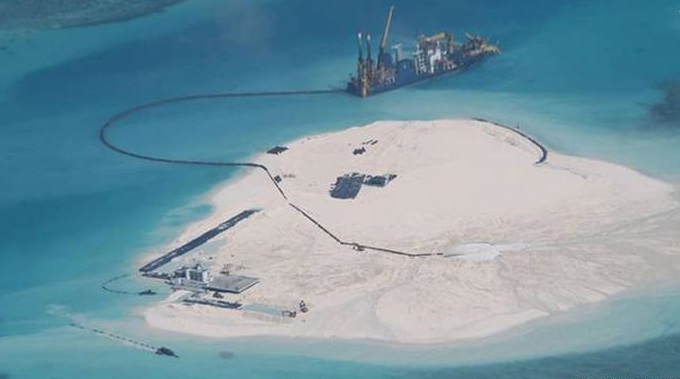


BEIJING, Aug. 5 -- The "three halts" proposal pushed forward by Washington during the ongoing Association of Southeast Asian Nations (ASEAN) foreign ministers' meeting is nothing but a new trick to stir tensions in the South China Sea.
Calling on halts in land reclamation, construction and "aggressive actions" that could further heighten tensions, the United States has, intentionally or unintentionally, ignored two simple facts.
Firstly, China's reclamation and construction activities on the Nansha islands and reefs are not blameworthy as those islands and reefs fall within the scope of China's sovereignty, and consequently are lawful, reasonable and justified.
Secondly, China is not the first and only party that has done land reclamation and construction in the South China Sea. The United States can not simply ignore what others, including the Philippines, are doing in the region while reproaching China's lawful move in particular.
Washington's double standards not only weaken its moral high ground on the South China Sea issue, but also jeopardize the rationality of its own proposal, making it nothing more than empty talk.
So here comes the question: Why has Washington made the seemingly even-handed yet actually unrealistic proposal?
To put it in a nutshell, a chaotic South China Sea serves the U.S. national interests as it would be easier and safer for Washington to blame China for the mess and isolate Beijing by driving a wedge between China and ASEAN countries, thus paving the way for a U.S. "pivot" to Asia.
Having failed to clinch a Trans-Pacific Partnership (TPP) deal, the economic arm of the pivot to Asia, in Hawaii on Friday, the United States is now using the South China Sea issue as a political arm to intervene in the region.
By staging patrols and joint military drills in the area, the United States has clearly intervened and stirred tensions in the South China Sea, breaking its promise that Washington take no side in the row.
Meanwhile, China's actions have served as a foil to those of the United States. China has made sincere and painstaking efforts to implement the Declaration on the Conduct of Parties in the South China Sea and enhance consultations on the Code of Conduct to maintain peace and stability in the region.
If Washington really cares about a peaceful solution to the dispute, as it claims, it should carefully reconsider its approach to the South China Sea issue.
Day|Week

 Mums stage breastfeeding flash mob
Mums stage breastfeeding flash mob Moscow “spider-man” climbs Chinese skyscraper
Moscow “spider-man” climbs Chinese skyscraper Top 10 international destinations for Chinese millionaires
Top 10 international destinations for Chinese millionaires New-type self-propelled gun fires in drill
New-type self-propelled gun fires in drill Chinese artists create 'fall of an angel'
Chinese artists create 'fall of an angel' A glimpse of China's Zijinshan gold & copper mine
A glimpse of China's Zijinshan gold & copper mine Hot figure show in SW China
Hot figure show in SW China Evolution of Chinese beauties in a century
Evolution of Chinese beauties in a century